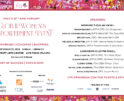
Lisa Lisson â President, FedEx Canada

The Happiness Legacy
By Ruchika Tulshyan
Lisa Lisson is proof that life can go on after a tragedy, if you persevere. The 42-year-old mother-of-four lost her husband to a heart attack. A year later, she was named the first female president of FedEx, Canada.
With more than 6,000 employees in 70 locations, Lisson says her success secret is “burning the shoe-leather” and being approachable. Nearly 60 percent of her executive team is female, vs. the 22 percent industry average in Canada.
Here, she tells Little PINK BOOK why more women need ‘me’ time, how living in the “now” helped her overcome a personal tragedy, and how she got her job after a 20-year interview.
Little PINK BOOK: How did you get your job at FedEx?
LL: At the time I was looking [for a job] there was no e-mail. I didn’t want to just mail my resume in, so I researched the marketing director’s assistant, and I showed up with my resume. We were chatting for a little while and the next day I sent her flowers thanking her for her time. A few days after that, there was an opening for a marketing assistant. And she pulled out my resume from her stack. I encourage people to create their own value proposition when you’re looking for employment. Create something unique about you so you can break through.
LPB: Do you have a success secret?
LL: In business, you need to be nice and kind. I know it sounds so simple but people forget that. I always say, “You need to get out and burn lots of shoe leather.” You need to be with your frontline employees, or go where the action is. When I get out there, I always say to my employees: “You create my to-do list. How can I help you be more successful?” Then employees feel they can talk to you and often, the best ideas come from them.
LPB: How did you cope with your personal tragedy? How did it affect your professional life?
LL: My husband had a heart attack in August 2007, when I was VP. He had a heart defect we were unaware of. On the eighth day, they told me he was brain dead and I should let him go. I kept him alive for two years and searched the world for some type of drug that could try and wake up his brain. It didn’t work.
My mother said to me: ‘Life is not about what happens to you, it’s about what you choose to do with what happens.’ So I made a conscious decision I was going to only focus in the moment that I am in right now. When I came to work and my husband was in the hospital, I focused on that moment, and being with my team. I had so many people come up to me who said during those two years, [they] had no idea what I was going through and [they] never would have known. I really had to train my mind, it sounds much simpler than it is.

LPB: Does appearing nice make women seem weak?
LL: I stress the importance of not being emotional at the office, and I stress that not just for women, but also for men. Nobody likes to work for someone that’s moody. So honestly, in my entire career, I was never emotional. I don’t take things personally; I don’t take emotion to the workplace. I don’t believe being nice and kind is a woman thing. People want to work around people who are positive and upbeat. When you walk in a meeting, you know it will be great because the person you’re dealing with has a can-do attitude. You can have good debates and good discussion – I’m not saying you avoid confrontation.
LPB: What’s biggest challenge for career women today?
LL: I have four children, so my biggest concern was, how I could be successful in my career and make sure that I didn’t spread myself too thin, and raise very happy children. I think for women who have children, it’s struggling to have that good balance of work and home. Also for women to have ‘me’ time – when you’re not the mother, you’re not the professional, you’re just you.
LPB: How do you find ‘me’ time?
LL: It’s important to have white space on the calendar, both professionally and at home. We should write down our goals. They say people who write down their goals have a higher chance of achieving them than those who don’t. I carve out time on my agenda at work, to spend time prioritizing and organizing. I look at my work goals, plan for the next week, reflect on the week I just went through, and re-assess my goals. At home my white space is carving out time to read. Also – exercise. I actually hate to exercise but I carve out three hours a week because I think it is very good for your mind, body, and soul.
LPB: What are your weaknesses?
LL: I have to do a better job of saying “no.” I can’t commit to everything that crosses my desk. I think we all want to please everybody, but for me I have to learn to say no and prioritize my team. I’m learning to say no to things at work, and learning to say no to things in my personal life. I was committing myself to too many things, and as a result it was encroaching on my white space on the calendar.
LPB: What’s the biggest career risk you’ve taken?
LL: I agreed to film a segment of Undercover Boss last year. I went undercover, and I actually did the job my employees do. I was a courier, I did the graveyard shift with a team in Calgary. I was worried what the employees would think about me going undercover, and what was I going to find. I’m quite fortunate that the outcome was incredible, but that was quite risky for me particularly because I had been in my job for a little over a year.

LPB: Is it lonely on the top?
LL: Not at all! I am very approachable. We have nearly 500 people in our main office. They are not afraid to knock on my door and say, ‘Hey, do you have a minute?’ I love that. If you want to be private, shut your door. I always tell leaders that. When I’m not traveling, I eat in the cafeteria every single day and I sit with a different group of employees [each time].
LPB: What’s your advice for job-seekers in this market?
LL: If you can’t get a position right away, volunteer your time. Once [a company] gets to know you and a position opens up, then you’ve already got your foot in the door. Also, one of my mentors told me: Every interaction with upper management is a mini-interview. When I got promoted to this position, my boss called me and he said, congratulations, you’re now the president of FedEx Canada! I said, ‘Aren’t you going to interview me?’ He said: ‘You’ve been interviewing for 20 years.’
LPB: How do you define success?
LL: How I find success is happiness. If my children are happy, if I’m happy, if my employees are happy, then to me, that is success. Seeing smiles on people’s faces, seeing them living in the moment in a happy way, that’s how I would ultimately define success.
LPB: What legacy do you hope to leave on a personal and professional scale?
LL: Helping people achieve their personal and professional goals, because I’ve been able to mentor them. And share my experience with them to help them be successful, but more importantly, to be happy. I love helping others. I mentor so many people; I’ve got so many friends who come to me for advice. I truly love helping people in any way that I can.
Recommended
-
Fall 2024 EventNovember 19th, 2024
-
REGISTER HERE FOR THE UPCOMING...September 19th, 2024
-
Spring Sales Are Ready To Bloo...March 1st, 2024
-
Two Months Away!August 24th, 2023
-
Pink’s Signature Spring ...May 17th, 2023















